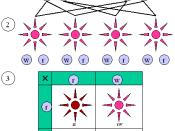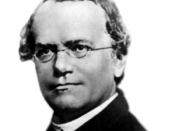Modern genetics began in the 1860's when Gregor Mendel, an Augustinian monk, discovered the fundamental principles of heredity. He came up with multiple theories such as the Particulate Theory of heredity which states that parents transmit genes to their children that remain as separate factors from one generation to the next. While attending the University of Vienna, Professor Doppler, a physicist, trained him to apply a quantitative experimental approach to the study of natural phenomena.
Also, at the University of Vienna, Unger, a botanist, interested him in the causes of inheritable variations in plants. He chose to study garden peas because they were available in many easily distinguishable varieties. Also, strict control over mating was possible to ensure the parentage of new seeds. Petals of these flowers enclose the pistil (the female part of the flower) and the stamen (the male part of the flower) which prevents cross-fertilization. He hybridized the plants by transferring pollen from one flower to another with an artist's brush.
He then used true breeding to produce offspring with the same traits as the parents when the parents are self-fertilized. He did this to insure that his plants were pure for the trait he wanted to study.
Mendel started his experiments with true-breeding plant varieties which he hybridized, cross-pollinated, in experimental crosses. He observed the transmission of selected traits for at least 3 generations. While doing his experiments, Mendel came up with the Law of Segregation which states that allele pairs separate during gamete formation (meiosis), and the pairing of these separated alleles are restored by the random fusion of gametes at fertilization. Alleles are alternative forms for a gene, and two alleles are necessary for each character trait. If the two alleles differ, one is fully expressed or dominant, and the other is completely...


